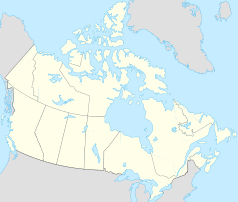Upper Liard (Yukon)
| Upper Liard | ||
|---|---|---|
| Location in Yukon | ||
|
|
||
| State : |
|
|
| Territory : | Yukon | |
| Coordinates : | 60 ° 3 ′ N , 128 ° 54 ′ W | |
| Residents : | 178 (as of 2006) | |
Upper Liard is a town in the Canadian Yukon west of Watson Lake on the Alaska Highway , not far from the British Columbia border .
145 of the 178 residents belonged to the Liard First Nation in 2006 . This group, which also lives around Two Mile , had a total of 1072 people in January 2009. Their language is the Kaska , which belongs to the Athabaskan language family, whereby it is closely related to the Talhtan , Sekani , Beaver , Slavey and the northern and southern Tutchone .
The name Liard goes back to French fur traders who called the eponymous river “Rivière aux Liards”, or “River of the (Canadian) poplars ”.
history
The traditional area of the Kaska was on the Upper Liard, the Frances and the Hyland Rivers . There they lived from hunting and collecting.
When the first fur traders came to the region, the nomadic Liard moved near the Lower Post trading post at the confluence of the Dease and Liard Rivers in northernmost British Columbia .
During the Second World War , the US began building the Alaska Highway in 1942 . The 195 m long Upper Liard River Bridge was built , connecting Watson Lake with Upper Liard. This changed the way of life of the Indians in much of the Yukon. Most of them settled down.
During the 1980s, several tribes entered into negotiations with the government, and some reached land use agreements. Eventually, they got their hands off the Department of Indian Affairs and Northern Development . This gave them self-government rights and negotiated land claims and compensation. In 2000 Chief Daniel Morris reached negotiations in Ottawa to have logging licenses revoked, which affected the Labiche area. In 2004 the government participated in a house building program with $ 619,382.
In 2007, the tribe acquired three of the four hotels in Watson Lake , plus an apartment block.
In 2001, the Liard signed an agreement with the territory on land use and consultation obligations of the raw material companies who want to operate in their area. But the Liard, under the leadership of their chief Liard McMillan, saw themselves cheated out of compensation, so that in January 2008 he announced corresponding lawsuits. The background was a dispute with the Ross River First Nation , which should negotiate compensation with mining companies, while the Liard should arrange the same with oil and gas companies. However, the Liard terminated this practice, which was to apply to the entire traditional area of the Kaska groups.
In September 2008, due to the global economic crisis, a drastic slump in the demand for raw materials became noticeable. Accordingly, the registrations for the Liard First Nation Development Corp. Resource Explorers' Gathering at Watson Lake fell sharply.
Web links
Remarks
- ^ Statistics Canada
- ^ According to information from the Department of Indian Affairs and Northern Development , Liard First Nation, Registered Population ( Memento from July 6, 2011 in the Internet Archive )
- ^ No more logging in Labiche, CBC News, February 16, 2000
- ^ Indian and Northern Affairs Canada, New Housing Initiative with Liard First Nation, May 7, 2004 ( Memento of February 16, 2009 in the Internet Archive )
- ↑ Yukon First Nation buys 3 Watson Lake hotels, CBC News, June 25, 2007
- ^ Liard First Nation takes Yukon mining battle to industry event, CBC News, January 25, 2008
- ^ Liard, Ross River bands clash over Yukon mining deals, CBC News, Jan. 25, 2008
- ↑ World market turbulence shakes up Yukon mining industry, CBC News, October 21, 2008
